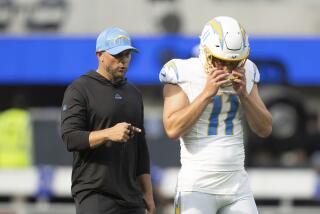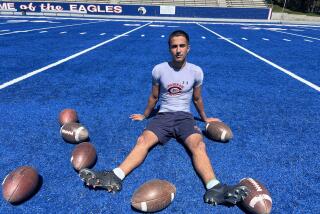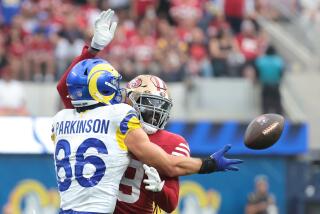Ford’s Kicking Has Impact : College football: More often than not, senior’s kickoffs are not returned.
Nine times, right on the sweet spot.
That’s where Cole Ford kept putting his right foot Saturday in USC’s 61-0 victory over California.
All his kickoffs went into the middle or rear of the end zone, or beyond it. Not one was returned by Cal’s Tyrone Edwards, the Pacific 10 Conference’s leading kickoff returner.
And where is the sweet spot on a regulation NCAA football?
“It’s just about two inches below the center line,” said Ford, a senior who hopes to continue his career in the NFL. “A football has a sweet spot, just like a baseball bat, or a golf club. When I get my foot on it, I know it right away.”
During his USC career, exactly half of Ford’s 160 kickoffs have been returned. This season, only 16 of 38 have been.
“He’s phenomenal,” Coach John Robinson said. “Usually when we kick off, I look first to see if we’re offside, then I watch the wedge the opponent is forming. But lately I find myself watching Cole’s ball going through the air and saying: ‘Wow!’ ”
Kicking coach Jeff Kearin puts a stopwatch on each of Ford’s kickoffs.
“His hang time is consistently between 4.0 and 4.2 seconds,” he said. “Average for a kickoff would be about 3.8. He really gets height on his ball.”
Can a kicker find work in the NFL solely as a kickoff man?
Brad Daluiso, the former UCLA kicker, has with the New York Giants. Although he is also used as a long field-goal kicker, he’s the only kicker, according to the NFL, used primarily on kickoffs. Only 15 of his 28 kickoffs this season have been returned.
Pro clubs are taking longer looks at college kickoff specialists this year, because the league is kicking off from the 30-yard line.
“Some teams will consider carrying a kickoff specialist, if they can get a real good one,” said Bob Ackles, assistant general manager of the Arizona Cardinals.
“Moving the kickoff back five yards, that’s changed a lot of thinking. Ideally, though, you’d still like a kickoff guy who can put it in the end zone to also kick field goals for you.”
Said Kearin: “A couple of NFL scouts have told me their clubs would carry a kickoff specialist if he could put it in the end zone every time.”
Ford, 6 feet 2 and 195 pounds, has made seven of 10 field-goal attempts this season and ranks fifth among Pac-10 kickers. But among the top 10 conference kickers, all but one have more attempts than Ford.
USC’s offense has played so efficiently lately that Ford hasn’t been asked to kick many.
“Cole has established himself as a great kickoff kicker, but he hasn’t yet established himself as a great field-goal kicker,” Kearin said. “I think he is a great field-goal kicker, and I think he’ll prove that in a situation where he has to kick a lot of field goals. He just hasn’t had to here.”
Ford has made 27 of 48 field-goal attempts at USC, his longest a 41-yard kick at Stanford in 1992.
Most disappointing miss?
“When I was a freshman, we were down three to Stanford on the last play and I missed a 45-yarder, wide right by a foot,” he said.
Both his USC coaches, first Larry Smith and now Robinson, have encouraged him, he said.
“When I missed that field goal against Stanford, Smith came up to me right away and told me it was a great try, that it shouldn’t have been up to me anyway.
“And the first time I met Robinson, we talked in his office about mental preparation. He told me to understand that I would miss some field goals, but that the important thing would be to forget it, to get my mind together, and prepare to make the next one.”
Ford sat out seven games last season because of a stress fracture in his back and made only two of six field-goal attempts. He had 20 attempts in his sophomore season, his busiest at USC.
Ford is a graduate of kicking specialist Ray Pelfry’s summer camps. A former Green Bay Packer and New York Giant punter, Pelfry has taught thousands of kickers at camps in the last 20 years.
“Cole has a big-time pro leg,” Pelfry said.
Becoming a college kicking specialist required a psychological adjustment for Ford, who played wide receiver and defensive back at Sabino High in Tucson.
At a college football practice, kickers appear to be only part-time members of the team.
Actually, their practice time occurs before and after the rest of the team is on the field.
“A kicker can get lonely out there, especially if you missed a couple of field goals in the last game,” Ford said. “You’re more sensitive to what people think. You have a feeling that you let your teammates down, even though no one says anything. In high school, I could contribute in other ways if I missed, because I played offense and defense.”
More to Read
Go beyond the scoreboard
Get the latest on L.A.'s teams in the daily Sports Report newsletter.
You may occasionally receive promotional content from the Los Angeles Times.






